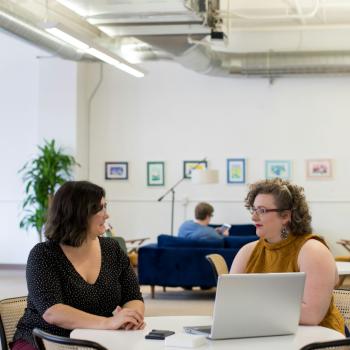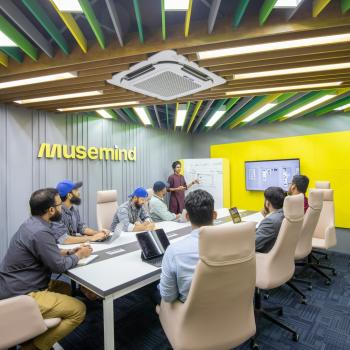
Generative AI (Gen AI) is fundamentally transforming industries, reshaping the way professionals innovate, create, and solve problems. These systems, capable of generating text, images, music, and complex solutions, are not just tools—they are catalysts for a paradigm shift in the professional and creative landscapes. For business leaders, this transformation raises pressing questions about the future of work and the evolving definition of human value in a world increasingly driven by Gen AI, with employees suffering from automation anxiety, the fear that their skills may become obsolete.
How Will Gen AI Shift Skills and Values?
Humanity has always prided itself on its creativity, emotional intelligence, critical thinking, and ethical reasoning. These traits have driven innovation and built meaningful relationships. However, Gen AI is challenging these boundaries, producing outputs that rival or surpass human capabilities in areas like content creation, data analysis, generating innovation, and data-driven decision-making.
As AI encroaches on tasks traditionally performed by humans, it forces us to rethink what makes us unique. Historically, identity and value have been tied to specific roles—craftsman, analyst, writer—but these roles are now at risk of being displaced or significantly altered by AI. Instead of viewing AI as a threat, professionals and leaders must focus on areas where human strengths remain indispensable: emotional depth, strategic foresight, and ethical judgment. By embracing this shift, we can redefine what it means to be uniquely human in a technology-driven world.
Declining Relevance of Certain Skills
With Gen AI’s ability to process and generate information at scale, some skills are becoming less critical in the professional sphere. Tasks that rely on repetitive and predictable cognitive functions, such as data entry, summarizing reports, and even basic coding, are now easily handled by AI systems. Similarly, routine problem-solving and decision-making, where inputs and outcomes are clearly defined, are areas where AI consistently outperforms humans in speed and accuracy.
Content creation in isolation is also losing prominence. AI tools like ChatGPT and DALL-E can produce high-quality drafts, designs, and media instantly, reducing the need for human involvement in the initial stages of creation. This does not mean human creativity is obsolete, but its role is shifting from generation to curation and refinement. Leaders must recognize these changes and guide their teams toward higher-order skills that complement, rather than duplicate, AI capabilities.
The Rise of More Human-Centric Skills
As AI takes over routine and technical tasks, uniquely human qualities will become more valuable than ever. Emotional and social intelligence will be critical in roles that require connection, trust, and understanding. Leaders, counselors, and caregivers will continue to rely on their ability to empathize and foster meaningful relationships—skills that machines cannot easily replicate.
Strategic and holistic thinking will also gain importance. AI excels at processing vast amounts of data but struggles with integrating insights into complex, real-world contexts. Professionals who can synthesize information across domains, anticipate long-term consequences, and align decisions with broader organizational goals will remain indispensable.
Creativity, while still vital, is evolving. Instead of focusing on producing content, humans will increasingly act as curators, guiding and refining AI-generated outputs to align with cultural, ethical, and organizational values. Ethical and moral judgment, too, will become a defining skill as professionals navigate the biases and unintended consequences of AI systems, ensuring that decisions driven by AI align with fairness and societal well-being.
Adaptability and learning agility will round out the skillset of the future. With AI technologies evolving rapidly, the ability to learn and adapt will distinguish those who thrive in this new landscape. Professionals and organizations that embrace lifelong learning will be best positioned to stay ahead.
Collaboration Over Competition
The future of work is not about competing with AI but collaborating with it. The most successful professionals will be those who understand how to integrate AI into their workflows, leveraging its efficiency while maintaining human oversight. This synergy—where humans provide vision, ethical guardrails, and emotional intelligence—will unlock new opportunities for innovation and growth.
Despite AI’s capabilities, the “human touch” remains irreplaceable in fields like healthcare, education, and leadership. Trust, compassion, and cultural understanding are essential in these areas and cannot be replicated by machines. Instead of replacing humans, AI serves as an augmentation tool, freeing up time for higher-value activities. For example, marketing teams can use AI to analyze consumer data, allowing humans to focus on crafting strategic campaigns and storytelling.
Leaders should focus on creating systems that enable this partnership. By blending human insight with AI capabilities, organizations can achieve results that neither could accomplish alone, as I have seen in my consulting to help leaders adopt Gen AI effectively. Thriving in the age of generative AI requires intentional preparation. Lifelong learning should become a core value, with professionals continually updating their skills and knowledge to stay relevant. This includes gaining a baseline understanding of AI tools and how to use them effectively, as well as honing uniquely human strengths like empathy, creativity, and ethical reasoning.
Organizations must invest in fostering adaptability within their teams. This means encouraging experimentation, supporting cross-functional learning, and creating environments where employees feel empowered to explore new ways of working with AI. By aligning professional development with the opportunities created by AI, businesses can future-proof their workforce.
Technology literacy will also be essential. Leaders should ensure their teams understand AI’s capabilities and limitations, enabling them to collaborate effectively with these tools while maintaining critical oversight and managing risks.
Conclusion: Redefining Humanity in a Gen AI World
Generative AI, when deployed strategically and adapted to effectively, is not a threat but an opportunity—a chance to redefine what it means to be human and to elevate our contributions in the workplace. As machines handle routine tasks, humans can focus on what truly matters: connection, creativity, curation, strategic vision, and ethical leadership.
For business leaders and professionals, the key to thriving in this new era is to embrace AI as a partner. By cultivating adaptability, fostering uniquely human qualities, and investing in continuous learning, we can shape a future where technology amplifies, rather than diminishes, our humanity.
The rise of generative AI is not the end of human relevance but the beginning of a new chapter. In this chapter, humans are not just workers or creators—they are curators, strategists, and ethical stewards, guiding technology to serve the greater good. Together, humans and AI can build a future defined by innovation, empathy, and purpose.
Key Take-Away
Will Gen AI replace us or redefine us? The future lies in collaboration, not competition… >Click to tweet
Image credit: Vitaly Gariev/unsplash
Originally published in Disaster Avoidance Experts
Dr. Gleb Tsipursky was named “Office Whisperer” by The New York Times for helping leaders overcome frustrations with hybrid work and Generative AI. He serves as the CEO of the future-of-work consultancy Disaster Avoidance Experts. Dr. Gleb wrote seven best-selling books, and his two most recent ones are Returning to the Office and Leading Hybrid and Remote Teams and ChatGPT for Thought Leaders and Content Creators: Unlocking the Potential of Generative AI for Innovative and Effective Content Creation. His cutting-edge thought leadership was featured in over 650 articles and 550 interviews in Harvard Business Review, Inc. Magazine, USA Today, CBS News, Fox News, Time, Business Insider, Fortune, The New York Times, and elsewhere. His writing was translated into Chinese, Spanish, Russian, Polish, Korean, French, Vietnamese, German, and other languages. His expertise comes from over 20 years of consulting, coaching, and speaking and training for Fortune 500 companies from Aflac to Xerox. It also comes from over 15 years in academia as a behavioral scientist, with 8 years as a lecturer at UNC-Chapel Hill and 7 years as a professor at Ohio State. A proud Ukrainian American, Dr. Gleb lives in Columbus, Ohio.













